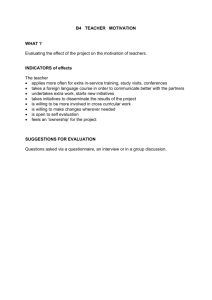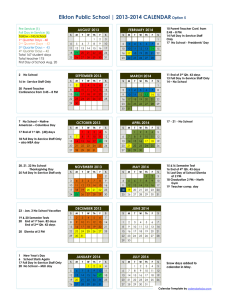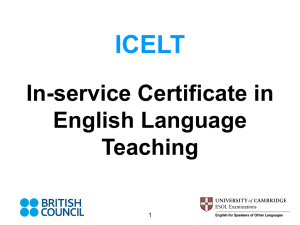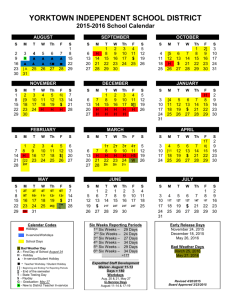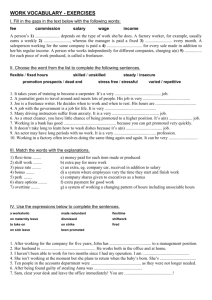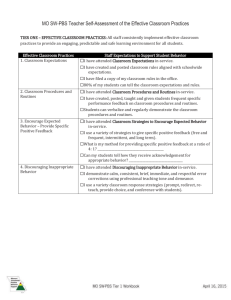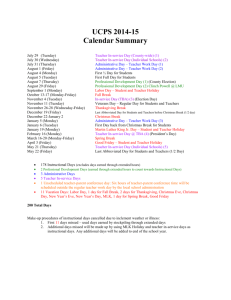Document 10466824
advertisement
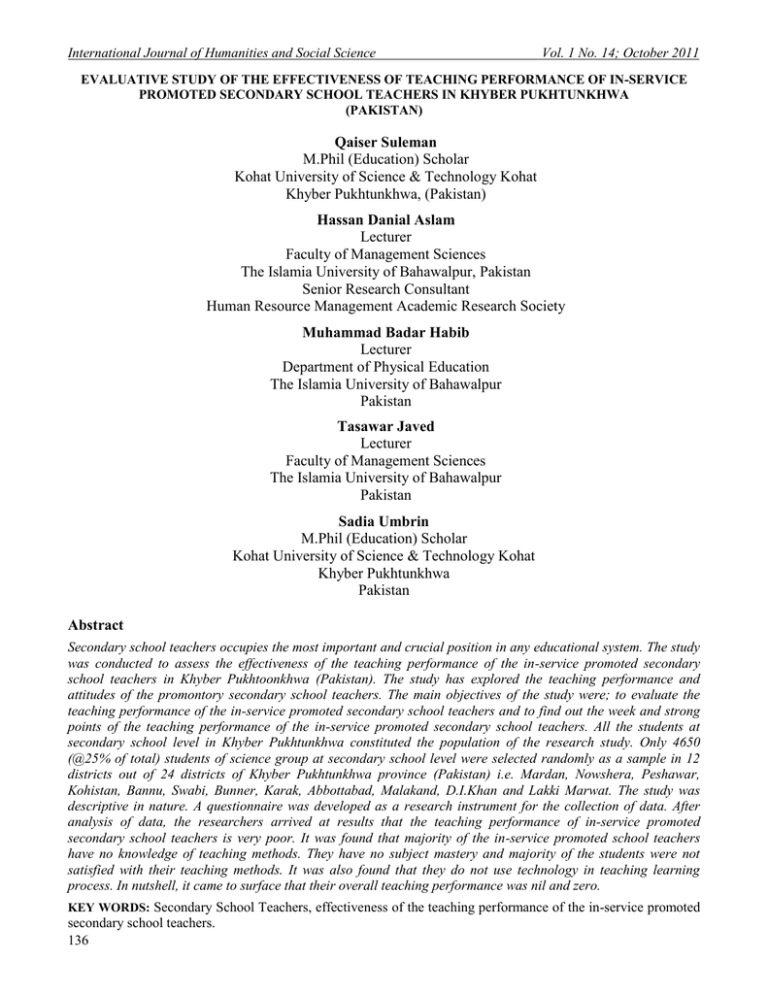
International Journal of Humanities and Social Science Vol. 1 No. 14; October 2011 EVALUATIVE STUDY OF THE EFFECTIVENESS OF TEACHING PERFORMANCE OF IN-SERVICE PROMOTED SECONDARY SCHOOL TEACHERS IN KHYBER PUKHTUNKHWA (PAKISTAN) Qaiser Suleman M.Phil (Education) Scholar Kohat University of Science & Technology Kohat Khyber Pukhtunkhwa, (Pakistan) Hassan Danial Aslam Lecturer Faculty of Management Sciences The Islamia University of Bahawalpur, Pakistan Senior Research Consultant Human Resource Management Academic Research Society Muhammad Badar Habib Lecturer Department of Physical Education The Islamia University of Bahawalpur Pakistan Tasawar Javed Lecturer Faculty of Management Sciences The Islamia University of Bahawalpur Pakistan Sadia Umbrin M.Phil (Education) Scholar Kohat University of Science & Technology Kohat Khyber Pukhtunkhwa Pakistan Abstract Secondary school teachers occupies the most important and crucial position in any educational system. The study was conducted to assess the effectiveness of the teaching performance of the in-service promoted secondary school teachers in Khyber Pukhtoonkhwa (Pakistan). The study has explored the teaching performance and attitudes of the promontory secondary school teachers. The main objectives of the study were; to evaluate the teaching performance of the in-service promoted secondary school teachers and to find out the week and strong points of the teaching performance of the in-service promoted secondary school teachers. All the students at secondary school level in Khyber Pukhtunkhwa constituted the population of the research study. Only 4650 (@25% of total) students of science group at secondary school level were selected randomly as a sample in 12 districts out of 24 districts of Khyber Pukhtunkhwa province (Pakistan) i.e. Mardan, Nowshera, Peshawar, Kohistan, Bannu, Swabi, Bunner, Karak, Abbottabad, Malakand, D.I.Khan and Lakki Marwat. The study was descriptive in nature. A questionnaire was developed as a research instrument for the collection of data. After analysis of data, the researchers arrived at results that the teaching performance of in-service promoted secondary school teachers is very poor. It was found that majority of the in-service promoted school teachers have no knowledge of teaching methods. They have no subject mastery and majority of the students were not satisfied with their teaching methods. It was also found that they do not use technology in teaching learning process. In nutshell, it came to surface that their overall teaching performance was nil and zero. KEY WORDS: Secondary School Teachers, effectiveness of the teaching performance of the in-service promoted secondary school teachers. 136 © Centre for Promoting Ideas, USA www.ijhssnet.com INTRODUCTION It is a proved fact that the development of a nation depends upon the standard of their educational system. Teacher education is playing a vital and crucial role in reforming and strengthening the society and is directly responsible to the development of a nation. It is an instrument which is used to change the social, economic, cultural and political system of the country. Since teacher education is system which prepares competent, talented and professionally skilful teachers which in turn produce talented individual for the development of nation. Therefore, teacher education has the most crucial position in the entire system of education. So it is imperative to pay full attention to make teacher education more effective and successful Government of Pakistan (1959) stated that “No education system is better than its teachers”. Keeping in the view about statement it is right to say that a teacher plays a very crucial role in the nation building. So it is imperative that the teacher should be competent and professionally skilful. Secondary school teacher plays an important and crucial role at secondary school level. I would like to say that if secondary school teachers (Science) succeeded in framing sound base of science subjects to the students of secondary level, it is justified to say that they will be able to make atomic bomb. That’s why, these teachers occupies the most important and crucial position in entire educational system. The future status of the students depends upon the teaching performance of the teachers at secondary level. At secondary level, two types of secondary school teachers are appointed i.e. Senior English Teacher (Science) and Senior English Teacher (General). The former is generally known as Science Teachers. In Khyber Pukhtunkhwa these teachers are recruited by two means i.e. direct appointment through selection by the provincial public service commission and in-service promotions by the department of education. According to the current service structure, 50% in-service teachers are promoted though department of education and 50% are appointed through Provincial Public Service Commission. This research paper was written in order to evaluate the effectiveness of the teaching performance of the in-service promoted secondary school teachers. REVIEW OF RELATED LITERATURE Secondary education occupies the most important and critical position in any educational system. The position of secondary education is generally paradoxical in any society. It is expected that secondary education will play a transitional role between basic education and further (higher) education as well as to play a terminal role by providing and supplying required manpower for the development of the country (AIOU, 1998, p.3). Secondary school teachers play a vital role in improving student’s characters and academic achievement. That’s why, these teachers should be able and competent in classroom management, teaching methods and knowledge of their subjects. Mohanty (2003) stated that an effective teacher should have control on overall classroom environment and should possess the abilities and qualities of planning organization and discipline. Effectiveness of teaching learning is the outcome of effective classroom management. Effective teaching learning is the outcome of effective classroom management. Teachers should play a vital and crucial role in enhancing the classroom atmosphere, their teaching learning process, interaction, control and human relations. The teacher should be democratic mind and not autocratic. In Khyber Pukhtunkhwa these teachers are recruited by two means i.e. direct appointment through selection by the provincial public service commission and in-service promotions by the department of education. According to the current service structure, 50% in-service teachers are promoted though department of education and 50% are appointed through Provincial Public Service Commission. The terms and conditions for the recruitment of secondary school teachers are the following: Designation SET (Science) SET (General) Required Qualifications B.A/B.Ed B.Sc/B.Ed Scale of Pay B.P.S. 16 B.P.S. 16 Schools High & HSS Secondary Schools High & HSS Secondary Schools (Affridi, 1998) In Khyber Pukhtunkhwa, both types of secondary school teachers perform different type of duties. S.E.Ts (Science) perform generally the following duties: Class 09 09 09 Subjects to be taught Physics Chemistry Biology Class 10 10 10 Subjects to be taught Physics Chemistry Biology 137 International Journal of Humanities and Social Science Vol. 1 No. 14; October 2011 S.E.Ts (General) perform generally the following duties: Class 09 09 09 Subjects to be taught Urdu English G. Science Class 10 10 10 10 Subjects to be taught Urdu English G. Science Pakistan Studies The institutions, which prepare secondary school teachers, are known as Colleges of education and those institutions, which provide advanced training by awarding M.A Edu and M.Ed degrees, are called Institutes of Education and Research. These institutions are generally affiliated with universities. These professional training institutions of teachers bear a direct relation between the education changes and the role of teachers. The respective courses of studies reflect this and generally contain the following elements in them. 1. 2. 3. 4. 5. Modern Methodology History of Education and its impact on our own education Guidance and Counseling Testing and Management Anthropology and the like Subjects 6. 7. 8. 9. 10. Philosophy of Education Child Development Educational Psychology Sociology of Education (Rasool & Sheikh, 1998, p.208) In Pakistan, there are various programmes for the training of secondary school teachers. These are explained as below: I. B.ED PROGRAMME (14 + 1) MODEL The B.Ed (14 + 1) model is one-year programme and consists of 46 weeks. A student can take admission in B.Ed (14 + 1) programme after passing graduation (B.A/B.Sc). After getting B.Ed (14 + 1) degree, a teacher becomes able to teach to secondary classes. The detail of this model is given below; Detail Description of Course of Study of B.Ed Programme (14 + 1) Model S.No. 1. 2. 3. 4. 5. 6. 7. 8. 9. Name of the Subjects Perspectives of Education in Pakistan Human Development and Learning School Organization and Management Evaluation and Guidance Society, School and Teachers Individual Project Two Courses with two papers (content & methods of teaching) to be selected from any one for these areas: (a) General (b) Science (c) Commercial (e) Agriculture (f) Home Economics Teaching Methods Total Marks Marks/Waitage 100 100 100 100 100 100 400 200 1200 Schedule of Work for B.Ed Programme (14 + 1) Model S.No. 1. 2. 3. 4. 5. 6. 7. 8. 138 Nature of Work First Semester Evaluation and Planning Short-Term Teaching Practice including Demonstration of Criticism Lessons Second Semester Break for Evaluation and Planning Teaching Practice Term Winter and Spring Breaks Total Duration 18 Weeks 01 Weeks 03 Weeks 18 Weeks 01 Weeks 05 Weeks 02 Weeks 48 Weeks © Centre for Promoting Ideas, USA www.ijhssnet.com Sequence of Courses of B.Ed Programme (14 + 1) Model First Semester S.No. 1. 2. 3. 4. Second Semester S.No. 1. 2. 3. 4. Name of the Course Perspectives of Education in Pakistan Human Development and Learning School Organization and Management Special Method Course (Content and Methodology) Name of the Course Evaluation and Guidance Society, School and Teachers Individual Project Special Method Course (Content and Methodology) Source: (Rasool & Sheikh, 1998, pp.209-210) II. B.S.ED PROGRAMME (12 + 3) MODEL For the training of Secondary School Teachers, there are two types of programmes are offered by Teacher Training Institutes and colleges namely B.S Education known as Concurrent Programmes where prospective teachers are admitted after passing Higher Secondary School Certificate or intermediate. This programme comprises Academic Course of 9 Credit hours, specialization of 45 credit hours, elective course of 6 credit hours, six professional courses of 18 credit hours and practical teaching of 13 credit hours (AIOU, 1998, p.179-180). The three-year programme (12+3) model of teacher training was initially launched in the Institute of Education & Research, Gomal University, Dera Ismail Khan. But due to unknown reason, it was stopped after completing the two training batches. Presently, it is going on in Government College of Education for Science Township Lahore, Government College of Education Afzalpur AJK and Federal College of Education Islamabad (Anees, 2005, p.65). Detail Description of Scheme of Studies for B.S Education (12 + 3) Model There are two courses are taught at this level. These are Academic and Professional Courses. The curriculum consists of 70% academic and 30% professional courses. The details of these courses are: 1. Academic Course Academic Course can be divided into three categories which are given below: (a) Required Courses (9 Credit Hours & 20% of the total Academic Course) Required Course can be divided into three categories which are given below in the table; S.No 1. 2. 3. (b) Credit Hours 3 3 3 Specialization Course (45 Cr. Hrs & 15% of the total Academic Course): Specialization Course can be divided into six categories which are given below in the table; S.No 1. 2. 3. 4. 5. 6. (c) Name of the Courses Pakistan Studies Urdu Functional English Name of the Group General Group Science Group Commerce Group Agriculture Group Home Economics Group Industrial Group (24 Cr. Hours) Programme B. A B.Sc B.Com B.Sc. Agriculture B.Sc. Hom. Economics B. Tech Elective Courses (6 Credit Course & 65% of the total Academic course) Elective Courses (6 Credit Hours for all and only 3 for Industrial Group). Any three from the following, not directly related to the area of content specialization. 139 International Journal of Humanities and Social Science S.# 1. Name of the Elective Course Cultural Anthropology S.# 8. 2. 3. 4. 5. 6. 7. Political Science and Current Affairs Socio-Economic Problems Environmental Sciences/Earth Sciences Human and Commercial Geography Military Science Islamic Culture 9. 10. 11. 12. 13. 14. Vol. 1 No. 14; October 2011 Name of the Elective Course Study of Literature: Urdu/Sindhi/ Punjabi/Balochi/English/Persian/Arabic Population Education Art and Craft Science and Man General Psychology General Philosophy General Science 2. Professional Courses Professional Course can be divided into four categories which are given below: (a). Required Courses (18 Cr. Hours): S. No. 1. 2. 3. 4. 5. 6. Name of the Course Perspectives of Education in Pakistan Human Development and Learning School Organization and Management Evaluation and Guidance Society, School and Teacher Individual Project Marks/Waitage 100 100 100 100 100 100 Additional Courses for Industrial Group (Only 06 Credit Hours): S.No. 1. 2. 3. Name of the Course Introduction of Vocational Education Occupational Analysis School Shop Management (b) Special Teaching Methods (06 Cr.Hours) Any two subjects from the following area of specialization are selected: S.No 1. 2. 3. 4. 5. 6. Name of the Subjects/Group General Group Agriculture Group Science Group Home Economics Group Commerce Group Industrial Group (In case of Industrial Group, 06 Cr. Hrs would be split up into three courses of 2 credit hours each). (c) Professional Electives (03 Cr. Hours for all except industrial Group) Any one of the following will be selected for the completion of the programme: S.# 1. 2. 3. 4. 5. Name of Group Educational Planning Guidance and Counseling Curriculum Development Comparative Education Modern Trends in Teaching S.# 6. 7. 8. 9. Name of the Group Theory and History of Education Education of Exceptional Children Preparation and Use of Instructional Material Educational Technology Education of Exceptional Children Source: (Rasool & Sheikh, 1998, pp.211-215) (d) Teaching Practice Teaching practice is the single most important experience in teacher education as it influences the classroom behaviour of student’s teachers. It should be a cooperative endeavour of the training institutions as well as the school and the department of education. Laboratory schools should be connected to all the training institutions for practical work and experimentation. Teaching practice will include observation of classroom teaching, special demonstration lessons, criticism lesson and full time teaching practice. The teaching practice will be of 13 Credit hours, which will be divided into lesson observation of 1 credit hour, short-term practice of 4 credit hours, and Long-term practices of 8 credit hours.The teaching practice has been classified into two parts i.e. short-term and long-term practice. 140 © Centre for Promoting Ideas, USA www.ijhssnet.com The duration of short-term and long-term teaching practice is 3 weeks and 5 weeks respectively. During teaching practice, the student is bound to give a minimum of 60 prepared lessons. Each prepared lesson will consist of a lesson plan, preparation of teaching aids, methods of presentation and evaluation of performance (Ramzan, 2002, p.28). 3. Admission Criteria for B.S.Ed Programme (12 + 3) Model (a) Required Minimum Qualification for Admission: Intermediate with second (2nd) division is the condition for the admission in B.S. Education (12 + 3) model. The Waitage for the intermediate is 60%. (b) Waitage of the Required Test for Admission: S.No. 1. 2. Nature of the Test Waitage in Percentage 20% 20% Written Test Interview Source: (Rasool & Sheikh, 1998, pp.211-215) III. B.ED (HONS.) 4 YEAR DEGREE PROGRAMME SECONDARY Scheme of Studies Eligibility Criteria: The eligibility criteria for the admission in B.Ed (Hons.) secondary is as blew; 1. FA/F.Sc / A level or equivalent with minimum 2nd Division. 2. FA/F.Sc/ A level with School Subjects. Duration of the Programme: Semester Duration: 4 Years No. of Semesters: 8 Semesters Semesters: 16-18 weeks Course Load Per Semester: 15-18 Credit Hours Number of Courses per semester; 5-6 (not more than 3 Lab/practical courses) Structure of the Scheme for B.Ed (Hons.) Secondary S.No. 1. 2. 3. 4. 5. Name of the Courses Compulsory Courses Professional Courses Foundation Courses Content Courses Teaching Practice Total Cr. Hrs 25 36 30 24-33 12 127-136 Cr. Hrs YEAR/SEMESTER WISE SCHEME OF STUDIES OF B.ED (HONS.) SECONDARY First (1st) Year Semester – I S.No. 1. 2. 3. 4. 5. 6. Name of the Courses Islamic Studies/Ethics English-I Foundations of Education Development of Education in Pakistan Content Course-I (from selected discipline-I) Content Course-I (from selected discipline-II) Total Credit Hours 2 3 3 3 3 3 17 Cr. Hours Semester-II S.No. 1. 2. 3. 4. 5. 6. Name of the Courses English-II Mathematics Critical Thinking and Reflecting Practices Human Development and Learning Content Course-II (from selected discipline-I) Content Course-II (from selected discipline-II) Total Credit Hours 3 3 3 3 3 3 18 Cr. Hours 141 International Journal of Humanities and Social Science Vol. 1 No. 14; October 2011 Second (2nd) Year Semester-III S.No. 1. 2. 3. 4. 5. 6. Name of the Courses Pakistan Studies Computer Literacy English-III Content Course-III (from selected discipline-I) Content Course-III (from selected discipline-II) General Methods of Teaching Total Credit Hours 2 2+1 3 3 3 3 17 Cr.Hours Semester-IV S.No. 1. 2. 3. 4. 5. 6. Name of the Courses Content Course-IV (from selected discipline-I) Content Course-IV (from selected discipline-II) Guidance and Counseling Classroom Assessment Classroom Management Supervised School Experience/Observation/Visits Total Credit Hours 3 3 3 3 3 3 18 Cr. Hours Third (3rd) Year Semester-V S.No. 1. 2. 3. 4. 5. 6. Name of the Courses Curriculum Development School, Community and Teacher Content Course-V (From Selected Discipline-I) Content Course-V (From Selected Discipline-II) Pedagogy-I (Methods of teachings related to specialization-I) Pedagogy-II (Methods of teachings related to specialization-II) Total Cr. Hrs 3 2+1 3 3 3 3 18 Cr. Hrs Semester-VI S.No. 1. 2. 3. 4. 5. Name of the Courses Research Methods in Education Pedagogy-III(Methods of teachings related to specialization-I) Pedagogy-IV (Methods of teachings related to specialization-II) Teaching Practice (Short Term) Introduction to Statistics Total Cr. Hrs 3 3 3 3 3 18 Cr. Hrs Fourth (4th) Year Semester-VII S.No. 1. 2. 3. 4. 5. Name of the Courses Inclusive Education Contemporary Issues and Trends in Education Research Project Comparative Education Information Communication Technology Total S.No. 1. 2. 3. Name of the Courses Educational Management and Leadership Teaching Practice (Long Term) Environmental Education Total Cr. Hrs 3 3 3 3 3 15 Cr. Hrs Semester-VIII Source: (Higher Education Commission, 2010) 142 Cr. Hrs 3 6 3 12 Cr. Hrs © Centre for Promoting Ideas, USA IV. www.ijhssnet.com ADE (ASSOCIATE DEGREE IN EDUCATION) PROGRAMME Two Years Scheme of Studies Eligibility Criteria: The eligibility criteria for the admission in ADE programme is given below; 3. FA/F.Sc / A level or equivalent with minimum 2nd Division 4. FA/F.Sc/ A level with School Subjects Duration: Semester Duration: 2 Years Total No. of Semester: 4 Semester Semesters: 16-18 weeks Course Load per Semester: 15-18 Credit Hours Number of Courses per semester; 5-6 (not more than 3 Lab/practical courses) Structure of the Scheme of Associate Degree in Education (ADE) Programme S.No. 1. 2. 3. 4. 5. Name of the Courses Compulsory Courses Professional Courses Foundation Courses Content Courses Teaching Practice Total Credit Hours 16 21 15 09 06 67 Cr. Hours Year/Semester wise Scheme of Studies of Associate Degree in Education First (1st) Year Semester – I S.No. 1. 2. 3. 4. 5. 6. Name of the Courses Functional English-I (Compulsory) Islamic Studies/Ethics (Compulsory) Child Development (Foundation) Urdu/Regional Languages (Content) General Science (Content) General Methods of Teaching (Foundation) Total S.No. 1. 2. 3. 4. 5. 6. Name of the Courses English-II (Communication Skills Compulsory) Computer Literacy (Compulsory) Classroom Management (Foundation) General Mathematics (Compulsory) Pakistan Studies (Compulsory) Methods of Teaching Islamic Studies (Professional) Total Credit Hours 3 2 3 3 3 3 17 Cr. Hours Semester-II Credit Hours 3 3 3 3 2 3 17 Cr. Hours Second (2nd) Year Semester-III S.No. 1. 2. 3. 4. 5. 6. Name of the Courses Teaching Literacy Skills (Professional) Art, Crafts and Calligraphy (Content) Teaching of Urdu/Regional Languages (Professional) Teaching of General Science (Professional) Instructional & Communication Technology in Education (Professional) Teaching Practice (Short Term) Total Credit Hours 3 3 3 3 2 3 17 Cr. Hours 143 International Journal of Humanities and Social Science Vol. 1 No. 14; October 2011 Semester-IV S.No. 1. 2. 3. 4. 5. 6. Name of the Courses Classroom Assessment (Foundation) Teaching of English (Professional) Teaching of Mathematics (Professional) School, Community and Teacher (Foundation) Teaching of Social Studies (Professional) Teaching Practice Total Credit Hours 3 3 3 2+1 2 3 17 Cr. Hours Source: (Higher Education Commission, 2010) OBJECTIVES OF THE STUDY Objectives of the study were: 1. To evaluate the effectiveness of the teaching performance of the in-service promoted secondary school teachers. 2. To diagnose the major areas of strength and weakness of the teaching performance of the in-service promoted secondary school teachers. METHODOLOGY 1. Population All the students of Class 09 and Class 10 at secondary school level in Khyber Pukhtunkhwa constituted the population of the study. 2. Sample Students at secondary school level were selected as a sample in 9 districts out of 24 districts of Khyber Pukhtunkhwa province (Pakistan) i.e. Mardan, Nowshera, Peshawar, Bannu, Karak, Abbottabad, Malakand, D.I.Khan and Lakki Marwat. Therefore, only 4650 (@10% of students) students of science group of the GHSs were taken as sample randomly. 3. Research Instrument The study was descriptive in nature. A questionnaire was developed as a research instrument for the collection of data. 4. Delimitation of the Study The study was delimited to the male in-service promoted secondary school teachers (Science Teachers). The study is further delimited to the students of Class 10 and Class 09 of science groups. RESULTS Table No. 1 Is your science teacher cooperative and democratic minded? No. of Students 4650 Yes 2523 No 2127 Yes % 54.26 No % 45.74 Analysis: The table illustrates that 54.26% students responded that their science teacher is cooperative and democratic and 45.74% responded that their science teacher is not cooperative and democratic minded. Table No. 2 Is your science teacher punctual and good disciplinarian? No. of Students 4650 Yes 1956 No 2694 Yes % 42.06 No % 57.94 Analysis: The table shows that 42.06% students responded that their science teacher is punctual and good disciplinarian and 57.94% responded that their science teacher is not punctual and good disciplinarian. Table No. 3 Does your science teacher possess a good personality? No. of Students 4650 Yes 1428 No 3222 Yes % 30.71 No % 69.27 Analysis: The table shows that only 30.71% students responded that their science teacher possesses a good personality and 69.27% responded that their science teacher does not possess a good personality. 144 © Centre for Promoting Ideas, USA www.ijhssnet.com Table No. 4 Does your science teacher come and teach with full preparation? No. of Students 4650 Yes 1426 No 3224 Yes % 30.67 No % 69.33 Analysis: The table shows that only 30.67% students responded that their science teacher come and teach with full preparation and 69.33% responded that their science teacher does not come and teach with full preparation. Table No. 5 Does your science teacher possess subject mastery & knowledge of teaching method? No. of Students 4650 Yes 0857 No 3793 Yes % 18.43 No % 81.57 Analysis: The table shows that only 18.43% students responded that their science teacher possesses subject master and knowledge of teaching methods and 81.57% responded that their science teacher does not possess. Table No. 6 Does your science teacher prepare lesson plan regularly for teaching? No. of Students 4650 Yes 0327 No 4323 Yes % 7.03 No % 92.97 Analysis: The table shows that only 07.03% students responded that their teacher prepares lesson plan regularly for teaching and 92.97% responded that their science teacher does not prepare lesson plan regularly for teaching. Table No.7 Does your science teacher check student’s homework regularly? No. of Students 4650 Yes 1265 No 3385 Yes % 27.20 No % 72.80 Analysis: The table shows that only 27.20% students responded that their science teacher check student’s homework regularly and 72.80% responded that their science teacher does not check student’s homework regularly. Table No. 8 Does your science teacher possess the abilities to solve your educational problems? No. of Students 4650 Yes 1307 No 3343 Yes % 28.11 No % 71.89 Analysis: The table shows that only 28.11% students responded that their science teacher possesses the abilities to solve our educational problems and 71.89% responded that their science teacher does not possess the abilities to solve our educational problems. Table No. 9 Your science teacher arranges weekly/monthly test to evaluate and assess the student’s academic achievement and performance? No. of Students 4650 Yes 1034 No 3616 Yes % 22.24 No % 77.76 Analysis: The table shows that only 22.24% students responded that their science teacher arranges weekly/monthly test to evaluate the student’s academic achievement and performance and 77.76% responded that their science teacher does not arranges weekly/monthly test. Table No. 10 Does your science teacher discuss student’s problems with principal? No. of Students 4650 Yes 0996 No 3654 Yes % 21.42 No % 78.58 Analysis: The table shows that only 21.42% students responded that their science teacher discusses student’s problems with principal and 78.58% responded that their science teacher does not discuss student’s problems with principal. Table No. 11 Do you satisfied with the teaching methods of your science teacher? No. of Students 4650 Yes 1139 No 3511 Yes % 24.49 No % 75.51 Analysis: The table shows that only 24.49% students responded that they are satisfied with their science teacher and 75.51% responded that they are not satisfied with their science teacher. 145 International Journal of Humanities and Social Science Vol. 1 No. 14; October 2011 Table No. 12 Is your science teacher a good resource person? No. of Students 4650 Yes 1066 No 3584 Yes % 22.92 No % 77.08 Analysis: The table shows that only 22.92% students responded that their science teacher is a good resource person and 77.08% responded that their science teacher is not a good resource person. Table No. 13 Does your science teacher provide instructional facilities for students? No. of Students 4650 Yes 0567 No 4083 Yes % 12.19 No % 87.81 Analysis: The table shows that only 12.19% students responded that their science teacher provides instructional facilities for students and 87.81% responded that their science teacher does not provide instructional facilities for students. Table No. 14 Does your science teacher take his classes regularly? No. of Students 4650 Yes 2605 No 2045 Yes % 56.02 No % 43.98 Analysis: The table shows that 56.02% students responded that their science teacher takes his classes regularly and 43.98% responded that their science teacher does not take his classes regularly. Table No. 15 Does your science teacher appreciate student’s creative work? No. of Students 4650 Yes 1931 No 2719 Yes % 41.53 No % 58.47 Analysis: The table shows that 41.53% students responded that their science teacher appreciates student’s creative work and 58.47% responded that their science teacher does not appreciate student’s creative work. Table No. 16 Does your science teacher use overhead projector for instructional purposes? No. of Students 4650 Yes 0026 No 4624 Yes % 00.56 No % 99.44 Analysis: The table shows that only 00.56% students responded that their science teacher uses overhead projector for instructional purpose and 99.44% responded that their science teacher does not use overhead projector for instructional purposes. Table No. 17 Does your science teacher explain scientific diagrams with charts? No. of Students 4650 Yes 1238 No 3412 Yes % 26.62 No % 73.38 Analysis: The table shows that only 26.62% students responded that their science teacher explains scientific diagrams with charts and 73.38% responded that their science teacher does not explain scientific diagrams with charts. Table No. 18 Does your science teacher use scientific equipments while teaching? No. of Students 4650 Yes 1329 No 3321 Yes % 28.58 No % 71.42 Analysis: The table shows that only 28.58% students responded that their science teacher uses scientific equipments while teaching and 71.42% responded that their science teacher does not use scientific equipments in teaching. Table No. 19 Does your science teacher conduct scientific experiments? No. of Students 4650 Yes 1318 No 3332 Yes % 28.34 No % 71.66 Analysis: The table shows that only 28.34% students responded that their science teacher conducts scientific experiments and 71.66% responded that their science teacher does not conduct scientific experiments. 146 © Centre for Promoting Ideas, USA www.ijhssnet.com Table No. 20 Does your science teacher use television and radio for instructional purpose? No. of Students 4650 Yes 0007 No 2643 Yes % 00.15 No % 99.85 Analysis: The table shows that only 0.15% students responded that their science teacher uses television and radio for instructional purposes and 99.85% responded that their science teacher does not use television and radio for instructional purposes. Table No. 21 Does your science teacher show models during instruction? No. of Students 4650 Yes 0769 No 3881 Yes % 16.54 No % 83.46 Analysis: The table shows that only 16.54% students responded that their science teacher shows models during instruction and 83.46% students responded that their science teacher does not show models during instruction. Table No. 22 Does your science teacher use blackboard during teaching learning process? No. of Students 4650 Yes 3254 No 1396 Yes % 69.98 No % 30.02 Analysis: The table shows that 69.98% students responded that their science teacher uses blackboard during teaching learning process and 30.02% responded that their science teacher does not use blackboard during teaching learning process. Table No. 23 Does your science teacher keep in mind individual difference of students during instruction? No. of Students 4650 Yes 0852 No 3798 Yes % 18.32 No % 81.68 Analysis: The table shows that only 18.32% students responded that their science teacher keeps in mind the individual differences of students during instruction and 81.68% responded that their science teacher does not keep in mind the individual differences of students during instruction. Table No. 24 Does your science teacher evaluate students work regularly and fairly? No. of Students 4650 Yes 0658 No 3992 Yes % 14.15 No % 85.85 Analysis: The table shows that only 14.15% students responded that their science teacher evaluates students work regularly and fairly and 85.85% responded that their science teacher does not evaluate students work. CONCLUSIONS After analysis of the data, the researchers arrived at the following conclusions: Strong Points: It was found that: 1. Majority of the in-service promoted secondary school teachers are cooperative and democratic minded. 2. Majority of the in-service promoted secondary school teachers use blackboard regularly during teaching learning process. 3. Majority of the in-service promoted secondary school teachers take their classes regularly. Weak Points: It was found that: 1. Majority of the in-service promoted secondary school teachers are not punctual and good disciplinarian. 2. Majority of the in-service promoted secondary school teachers do not possess good personality. 3. Majority of the in-service promoted secondary school teachers do not check student’s homework regularly. 4. Majority of the in-service promoted secondary school teachers do not possess the abilities to solve student’s educational problems. 5. Majority of the in-service promoted secondary school teachers do not arrange weekly/monthly test to evaluate the academic performance and achievement. 6. Majority of the in-service promoted secondary school teachers do not discuss student’s problems with principal. 147 International Journal of Humanities and Social Science Vol. 1 No. 14; October 2011 7. Majority of the in-service promoted secondary school teachers have no subject mastery and have no knowledge of teaching methods. 8. Majority of the students are not satisfied with the teaching methods of in-service promoted secondary school teachers. 9. Majority of the in-service promoted secondary school teachers are not a good resource person. 10. Majority of the in-service promoted secondary school teachers do not try to provide instructional facilities for students. 11. Majority of the in-service promoted secondary school teachers do not prepare lesson plan regularly for teaching. 12. Majority of the in-service promoted secondary school teachers do not come and teach with full preparation. 13. Majority of the in-service promoted secondary school teachers do not appreciate student’s creative work. 14. It was found that in-service promoted secondary school teachers do not use overhead projector, educational television and radio for instructional purposes. 15. Majority of the in-service promoted secondary school teachers do not explain scientific diagrams with charts. 16. Majority of the in-service promoted secondary school teachers do not utilize scientific equipments and apparatus during teaching learning process. 17. Majority of the in-service promoted secondary school teachers do not conduct scientific experiments. 18. Majority of the in-service promoted secondary school teachers do not show models during instructional process. 19. Majority of the in-service promoted secondary school teachers do not keep in mind the individual differences during teaching learning process. 20. Majority of the in-service promoted secondary school teachers do not evaluate students work regularly and fairly. RECOMMENDATIONS Keeping in view the conclusions, the researchers make some recommendations which are described as under: 1. Appointment of the secondary school teachers should be made through competitive and transparent examinations. 2. At least 75% appointment of the secondary school teachers should be done through provincial public service commission. 3. Special rules regulations and criteria should be introduced for the appointment of the in-service promoted secondary school teachers. 4. The principals of the schools should check the teaching performance of the in-service promoted secondary school teacher at least in a week regularly. 5. Special training should be given to the existing in-service promoted secondary school teachers in classroom management and teaching methods to equip them with the modern teaching methods and techniques. 6. In-service promoted secondary school teacher should be provided opportunities to equip them with the modern knowledge of science subjects i.e. chemistry, physics and biology. 7. In-service promoted secondary school teachers should be given a special training in educational technology so that they may become able to utilize technology in their teaching effectively. 8. In-service promoted secondary school teachers have no knowledge of scientific experiments. That’s why, it is imperative to give them special training in conducting scientific experiments. 9. Special refresher courses should be arranged for in-service promoted secondary school teachers to increase their teaching efficiency. 10. At secondary level, surprising visits of the higher authorities should be ensured to assess the teaching performance of the secondary school teachers. 11. It is also recommended that in-service promoted secondary school teachers should arrange weekly test for the assessment of academic achievement of their students. They should come to class with full preparation. 12. In-service training may be provided to all promoted secondary school teachers on professional skills at least once in every three years to enable them to perform their duties effectively. 148 © Centre for Promoting Ideas, USA www.ijhssnet.com 13. For in-service promoted secondary school teachers, a proper system of continuous evaluation may be made in all secondary school. The weak aspects of the promoted secondary school teachers should be diagnosed by the principals and senior staff and necessary measures should be taken for the improvement of these teachers. RECOMMENDATIONS FOR FURTHER RESEARCH STUDY 1. It is recommended that this type of research study should be conducted in other provinces of the country as well. 2. It is also recommended that this type of research study should be conducted at higher secondary level. 3. It is also recommended that this type of research study should be conducted to know the effectiveness of the teaching performance of the other cadre of teachers like, English teacher, Mathematics teacher etc. REFERENCES Affridi, A. K 1998. Educational Administration & School Organization, Peshawar. The Print man Publishing. P.187 A.I.O.U. 1998. Secondary Education. Study Guide for M.Ed, Code No. 827. Faculty of Education, Teacher Education Department, Allama Iqbal Open University, Islamabad. pp. 3, 179-180 Anees, M. 2005. Comparison of Formal and Non-Formal Systems of Teacher Education in Pakistan. Ph.D Thesis. University Institute of Education & Research, University of Arid Agriculture Rawalpindi, Pakistan. pp. 65 Govt. of N.W.F.P (2007-08). Annual Statistical Report of Schools in North West Frontier Province, Directorate of School & Literacy NWFP. Govt. of Pakistan. 1959. Report of the Commission on National Education. Ministry of Education, Karachi. Higher Education Commission. 2010. Curriculum of Education. Revised in 2010.higher Education Commission Islamabad, Pakistan. pp.14-28, 105-107 Mohanty, J. 2003. Teacher Education, New Delhi: Deep & Deep Publications. P.210 Ramzan, M. 2002. A Comparative Study of Teacher Education System of United State of America and Pakistan. Unpublished Ph.D Thesis, University of Arid Agriculture, Rawalpindi, Pakistan. p.28 Sheikh, M. & Rasool, M. G. 1998. Allied Material for Teacher Education in Pakistan, Islamabad, Pakistan, Symaz Printers, Allama Iqbal Open University, Islamabad. pp. 208-215. 149
